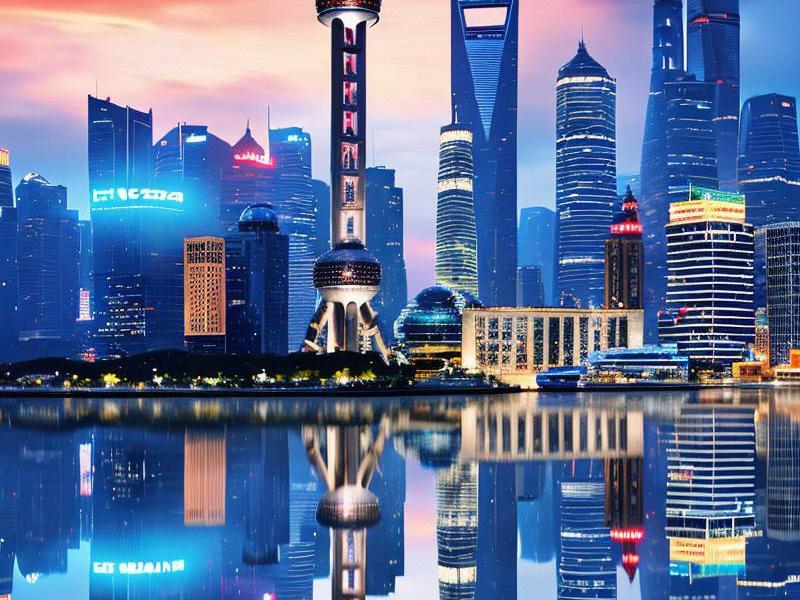This article delves into the transformation of Shanghai into a prominent global hub, highlighting its economic growth, urbanization, technological innovation, and increasing international influence.

Shanghai, a city that has long been a symbol of China's modernization, is now emerging as a significant global hub. Over the past few decades, this vibrant metropolis has undergone profound changes, transforming from a traditional port city into a leading center for finance, trade, technology, and culture on the world stage.
The economic development of Shanghai has been nothing short of remarkable. As one of China's four municipalities directly under the central government, Shanghai has consistently ranked among the top cities in terms of GDP in the country. Its strategic location at the mouth of the Yangtze River and its well-developed port facilities have made it a crucial gateway for international trade. The city's deep-water port, the Port of Shanghai, is one of the busiest in the world, handling millions of containers annually.
The financial sector in Shanghai has also flourished. The establishment of the Shanghai Stock Exchange and the inclusion of Chinese yuan-denominated financial products in the international market have further solidified the city's position as a global financial center. Numerous multinational corporations have set up their regional headquarters in Shanghai, attracted by the city's business-friendly environment and robust infrastructure.
Urbanization in Shanghai has been a key driver of its transformation. The city has witnessed rapid expansion and modernization, with towering skyscrapers and advanced transportation systems becoming iconic features of its skyline. The Bund, a historic waterfront area, has been revitalized, offering stunning views of the Pudong New Area across the Huangpu River. Pudong, once a rural area, has emerged as a symbol of Shanghai's economic prowess, home to the iconic Oriental Pearl Tower and the Jin Mao Tower.
上海龙凤419油压论坛
Innovation is another area where Shanghai has made significant strides. The city has invested heavily in research and development, fostering a thriving startup ecosystem. Zhangjiang Hi-Tech Park, often referred to as "China's Silicon Valley," is a hub for high-tech industries, attracting talent and investment from around the world. Shanghai's universities and research institutions are also playing a crucial role in driving innovation, collaborating with industry partners to develop cutting-edge technologies.
Cultural exchange and international influence have further elevated Shanghai's status as a global hub. The city has hosted numerous international events, including the World Expo in 2010, which attracted millions of visitors from around the globe. The Expo not only showcased China's achievements but also provided a platform for cultural exchange and cooperation. Shanghai's rich cultural heritage, combined with its modern amenities, makes it an attractive destination for tourists and expatriates alike.
The city's international influence extends beyond culture and trade. Shanghai is actively involved in global governance and cooperation, participating in international organizations and initiatives. The G20 Summit, held in Shanghai in 2001, was a significant milestone in the city's journey towards becoming a global leader. More recently, Shanghai has been working towards becoming a member of the Asian Infrastructure Investment Bank (AIIB), further enhancing its role in international economic affairs.
上海贵族宝贝sh1314
However, the rapid development of Shanghai has not been without challenges. The city faces issues such as traffic congestion, environmental pollution, and housing shortages. To address these challenges, the government has implemented various measures, including the expansion of public transportation networks, the promotion of green energy, and the development of affordable housing projects.
One of the most notable initiatives is the construction of the Shanghai Maglev Train, the world's first commercially operated high-speed magnetic levitation train. This futuristic mode of transportation not only reduces travel time but also serves as a symbol of Shanghai's commitment to innovation and sustainability. Additionally, the city has been investing in the development of smart city technologies, aiming to crteeaa more efficient and livable urban environment.
Shanghai's transformation into a global hub has also had a profound impact on its residents. The city offers a wide range of opportunities for education, employment, and cultural enrichment. The influx of talent from across the country and abroad has contributed to the city's dynamic and diverse community. Shanghai's residents enjoy a high standard of living, with access to world-class healthcare, education, and entertainment facilities.
上海贵人论坛
The city's educational institutions are renowned for their quality and innovation. Fudan University and Tongji University are among the top universities in China, attracting students from around the world. These institutions are not only centers of academic excellence but also play a crucial role in fostering innovation and entrepreneurship.
Cultural diversity is another aspect that makes Shanghai unique. The city is home to people from various ethnic backgrounds, each contributing to the rich tapestry of its culture. International festivals, such as the Shanghai International Film Festival and the Shanghai World Expo, provide platforms for cultural exchange and celebration.
In conclusion, Shanghai's emergence as a global hub is a testament to its resilience, adaptability, and vision. The city has successfully navigated the challenges of rapid urbanization and economic development, positioning itself as a leader in finance, trade, technology, and culture. As Shanghai continues to grow and evolve, it is poised to play an even more significant role on the global stage, inspiring other cities around the world with its achievements and innovations.
The journey of Shanghai towards becoming a global hub is not just a story of economic growth but also one of cultural enrichment and international cooperation. The city's ability to balance tradition and modernity, while addressing the challenges of urbanization, serves as a model for other rapidly developing cities. As Shanghai looks to the future, its commitment to innovation, sustainability, and global engagement will undoubtedly shape its destiny as a global powerhouse.